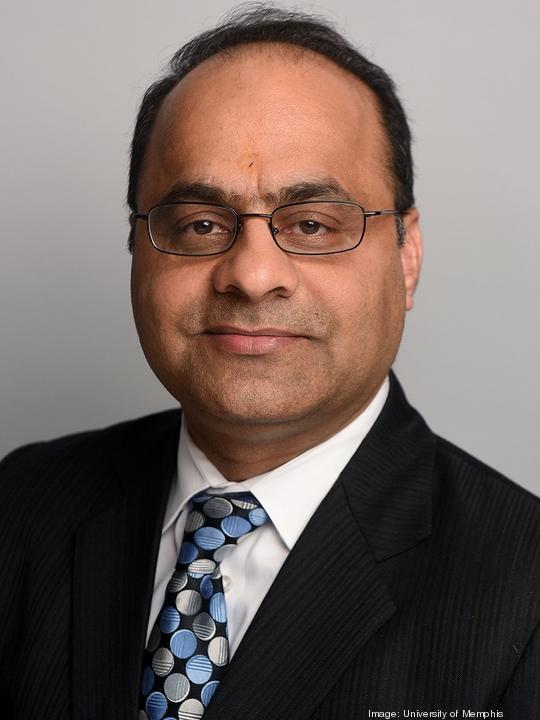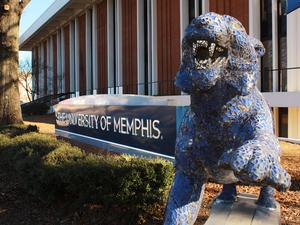
Ashish Joshi could give the most seasoned travelers a run for their money.
In 2002, he came to the U.S. from India, with about $3,800 in his pocket, and plans to earn a master’s degree in public health from Boston University. Then, once he completed the degree, he took a position at the University of Maryland. In 2009, he started working on his doctorate at the University of Texas Health Science Center and began traveling from Baltimore to the institution once a week.
After completing his Ph.D. in 2012, he was hired by the University of Nebraska Medical Center. Two years later, he was tapped to join the City University of New York, where he served in a variety of high-profile roles until August 2022 when he became the dean of the School of Public Health and a distinguished professor at the University of Memphis.
Throughout his career, he’s also done research in Nigeria, India, Brazil, Bangladesh, Haiti, and Geneva.
One might think all this uprooting and globetrotting could be exhausting. Just moving from New York to Memphis would be a significant change. But over the years, Joshi has learned to quickly adapt to his environment; and wherever he goes, he takes four key tenets with him.
“It goes ‘C’ for coping, ‘A’ for adaptability, ‘R’ for resilience, and 'E' for empathy,” he said. “With those principles, you can adapt to any environment, any situation, anything … as long as you're liking your job, and as long as you have a very clear mission and vision.”
So far, Joshi is liking his job as a dean at U of M — and his mission and vision seem to be clear.
Major motivation
The institution — which gained R1 status in December 2021 — is barreling forward in its university-wide research push, and Joshi is keen on doing his part. The first thing he did upon his arrival in the Bluff City was meet with each of the faculty members at the School of Public Health, and he’s encouraged them to seek out and apply for major research grants, even if it's new terrain for them. When speaking to MBJ, he noted with pride that a faculty member had recently applied for a K award, which is designated for researchers still early in their careers.
“I think one success leads to another, and people start to believe that they can actually do it,” he said. “I'll tell you right now, that there are some faculty who are now saying, ‘Oh, let's go for this big [grant].'”
Joshi also isn’t just encouraging his faculty members to apply for grants from the sidelines. He’s never been a “traditional administrator,” he explained, and has always been focused on research and entrepreneurship, regardless of the role he was in. When Joshi came to U of M, he didn’t waste any time collaborating with community organizations to apply for big grants.
He started in his role at U of M on Aug. 1. Within a month, he had teamed up with the Shelby County Health Department to apply for a five-year, $13.83 million grant to the Centers for Disease Control and Prevention (CDC), which would bolster the county’s existing public health infrastructure, while helping recruit, retain, and train the current and future public health workforce. U of M and the Health Department were awarded that grant, with U of M receiving about $8.7 million of the funds for its portion of the project.
And that’s just one example of the research efforts going on within the School of Public Health. Under Joshi’s leadership, it’s sought funding as part of a nine-state environmental justice project being led by the Research Triangle Institute. And it’s applied for a grant to create the Memphis Climate Health Environment Equity Research Lab (CHEER), which would study the impact of environment and climate on population health — how, for example, are factors like air pollution and rising temperatures affecting people with asthma and other chronic conditions?
The project proposal was submitted in collaboration with groups like Methodist Le Bonheur Healthcare and the Assisi Foundation; and the grant, valued at about $1 million, would come from the National Institute of Environmental Health Sciences (NIEHS).
The school expects to hear about the project soon, and the funds would raise the total amount of research awards the U of M receives in its fiscal year. In FY 2021, U of M eclipsed $50 million in research awards for the first time, earning $51.04 million. And in FY 2022, it nearly matched that record number, earning $49.38 million, according to U of M’s annual research report.
But for Joshi, the potential impacts go beyond a number or the university’s stature.
Looking ahead
Joshi believes U of M has a ripe opportunity to continue growing in prominence and become a perennial research institution.
“To be very frank, I am not even hesitant to say that when I was coming here, R1 was a big attraction,” he said.
But he also understands the role public health can play in society. It’s not just about doing research, he explained. It’s about doing impactful research.
“There's opportunity here, and I always say that I’d love to see the School of Public Health become a Memphis model of public health,” he said. “There's a social impact, an economic impact, a health impact, and a data impact. … We want to be a resource to the community. We want anybody and everybody who feels that there is a need to partner with us. The School of Public Health is open to those collaborations now."









